AGE OF THE ASSASSIN OP-ED
‘The underworld runs the ANC’ — assassinations analysis shows stark reality of violence in KZN
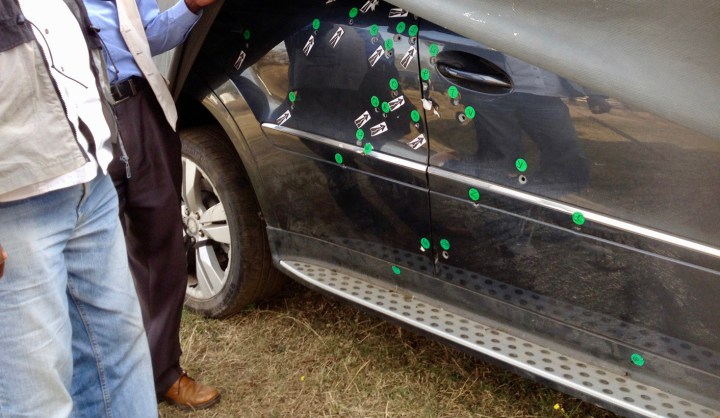
KwaZulu-Natal stands out among South Africa’s provinces for having the greatest frequency of politically linked assassinations.
Data collected by the Global Initiative on Transnational Organized Crime (GI-TOC) since 2000 shows a marked increase in the number of assassinations, especially since 2015. Of the 418 political hits recorded nationwide between 2000 and 2021, 213 took place in the last seven years, and of that number, 118 were in KwaZulu-Natal (KZN).
Observers warn that violence and intimidation are warping the political landscape of the region, allowing strongman politics to flourish. “People are terrified”, said veteran activist and violence monitor Mary de Haas. “It is layer upon layer of violence that involves thugs, mafia, drug dealers, corrupt politicians and taxi hitmen… In KZN, might is right. The bullies hold sway and it is getting worse.”
National picture of assassinations in South Africa
Through an analysis of public and media reporting from 2000–2021, we have compiled a database of 1,971 assassination cases in South Africa. These have been broken down into four categories: political motivation, organised crime, hits taken out to settle personal feuds, and hits relating to the taxi industry. Assassinations reached an all-time high in 2018 and have increased significantly since 2000 overall.
Taxi industry-related incidents were given their own category as the South African taxi industry is uniquely violent, with feuds between taxi associations and disputes over who controls routes regularly spilling over into violence. This is reflected in the data: 46% of all assassinations recorded were related to the taxi industry, 22% of the hits were linked to organised crime, 21% were politically motivated and 11% were personal.
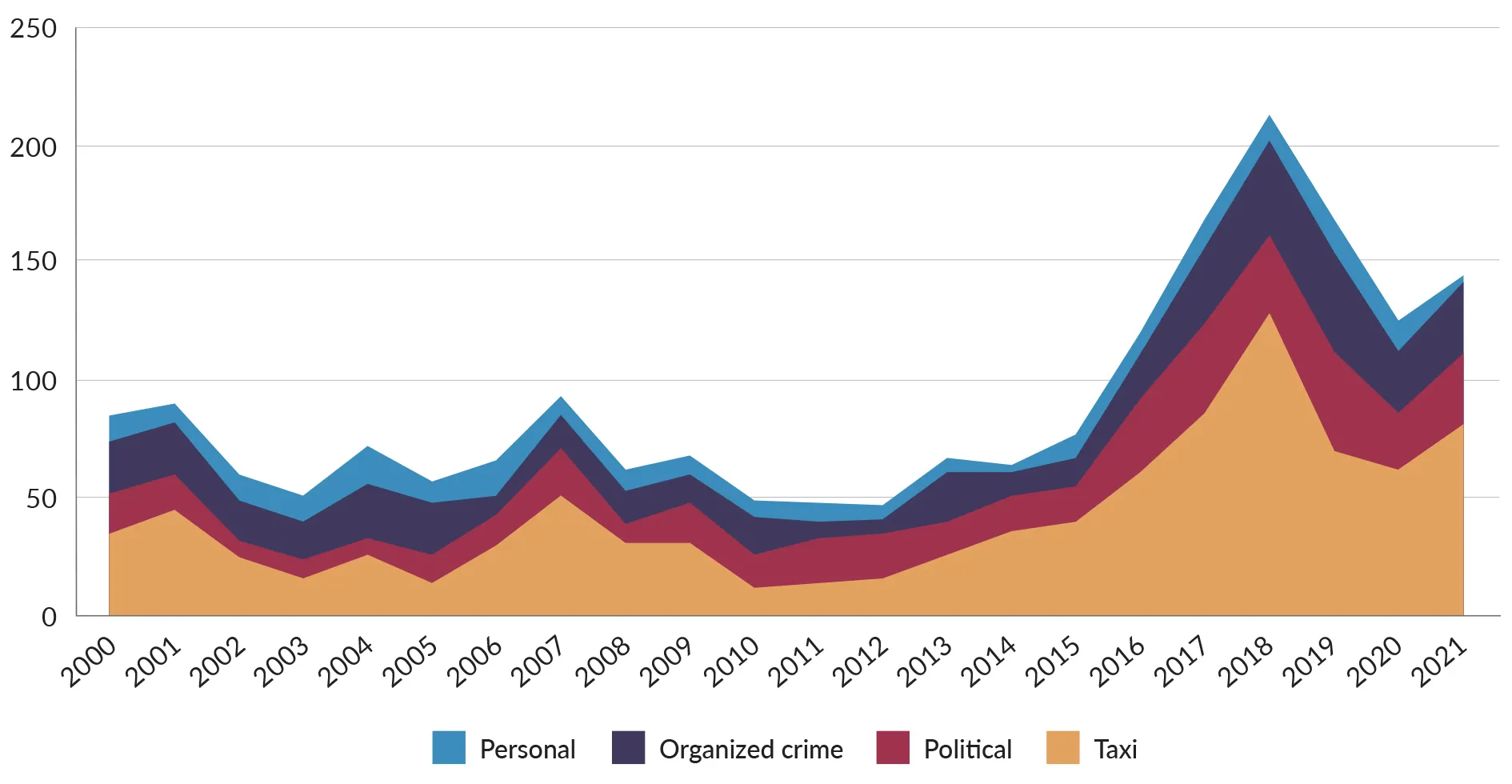
Assassinations-in-South-Africa-by-year-2000-2021
The overwhelming majority of assassinations (98%) were carried out using firearms, reflecting the widespread availability of illicit firearms and those diverted from legitimate sources such as the police force and private security companies.
South Africa’s hitmen are brutally effective — 87% of recorded assassination attempts resulted in the death of the victim, not forgetting that some incidents also result in bystanders being caught in the crossfire.
Almost half (49%) of assassinations take place at the victim’s home, often when leaving for work or arriving home. The killing of Sibusiso “S’bu” Maphumulo in 2018 is a typical case. Maphumulo was a ward councillor in Umlazi, KZN, and was shot several times as he arrived home from a meeting.
Kwazulu-Natal: The violence hotspot
For three of the last six years recorded in the GI-TOC’s assassinations database, politically linked assassinations in KZN were as high, or higher, than all South Africa’s other provinces combined.
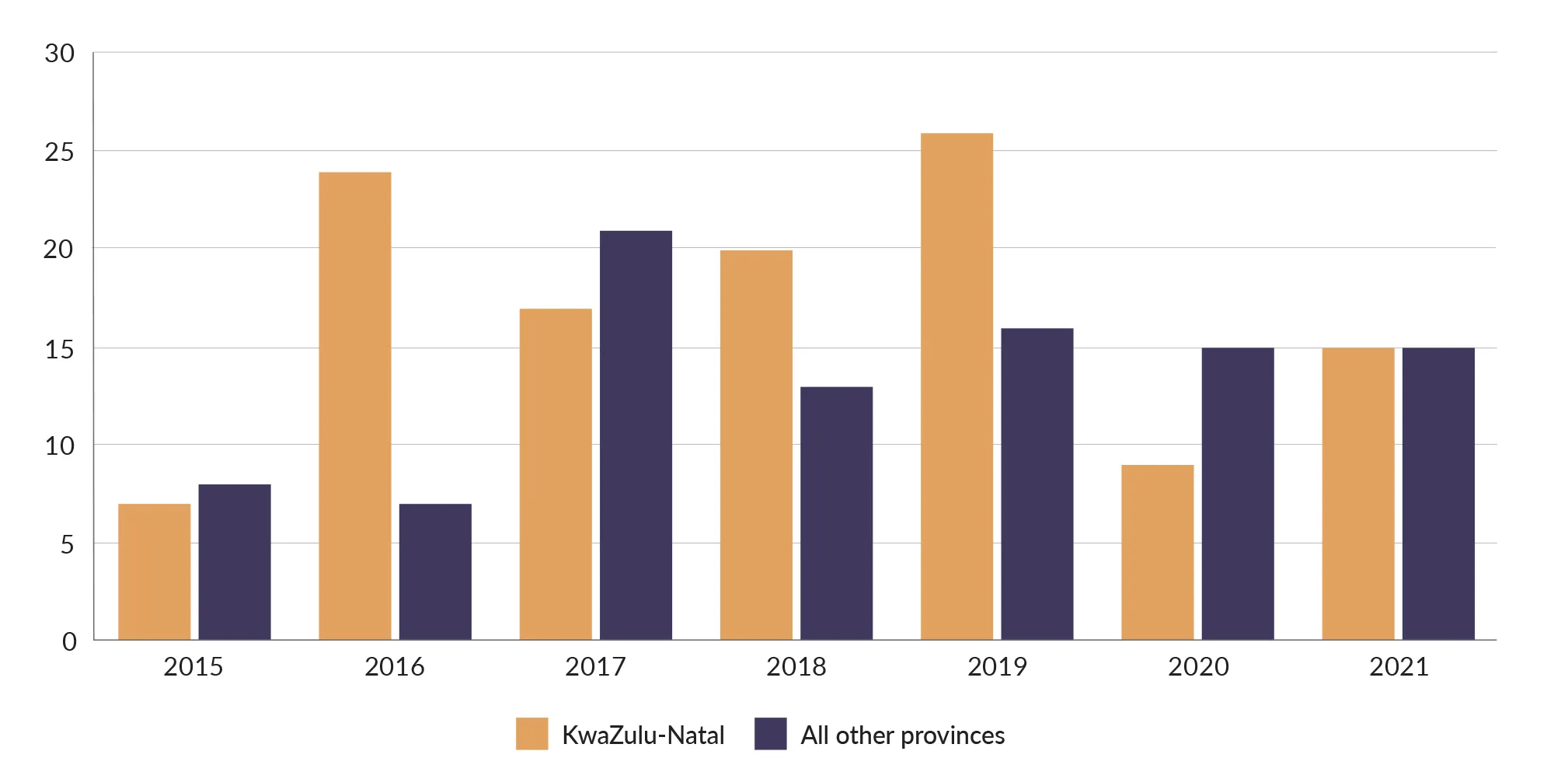
Trends-in-political-assassinations-in-South-Africa-2015-2021.
KZN also scored high in other categories. Of the 521 taxi killings recorded nationally since 2015, 173 were in KZN. This was followed by 129 in Gauteng, though there are strong links between the two provinces in terms of taxi associations, which have business in both areas and control over long-distance taxi routes. The KZN figures for organised crime hits are also the highest of all the provinces, at 58 of 202 total since 2015.
For Xubera Institute political analyst Xolani Dube, KZN’s political, taxi and organised crime hits are inextricably linked: “The underworld runs the ANC,” said Dube. “KZN is submerged in underworld killings that bear the hallmark of mafias. People who dispense patronage through councillors, mayors and ministers are gangsters, mainly involved with the taxi industry. And there is a convergence with private security companies that protect politicians and who run the construction industry. You can’t divorce these elements.”
‘Construction mafias’ — linked to the ANC’s Radical Economic Transformation (RET) faction, in which former president Jacob Zuma was a key figure — have become notorious for extorting major construction projects in KZN, with heavily armed men threatening violence and demanding large fees (usually 30% of the total value of the project) in return for allowing work to proceed.
In 2019, Webster Mfebe, CEO of the South African Forum of Civil Engineering Contractors, said that armed gangs had forced the abandonment of 84 infrastructure projects in South Africa worth more than R27-billion in total.
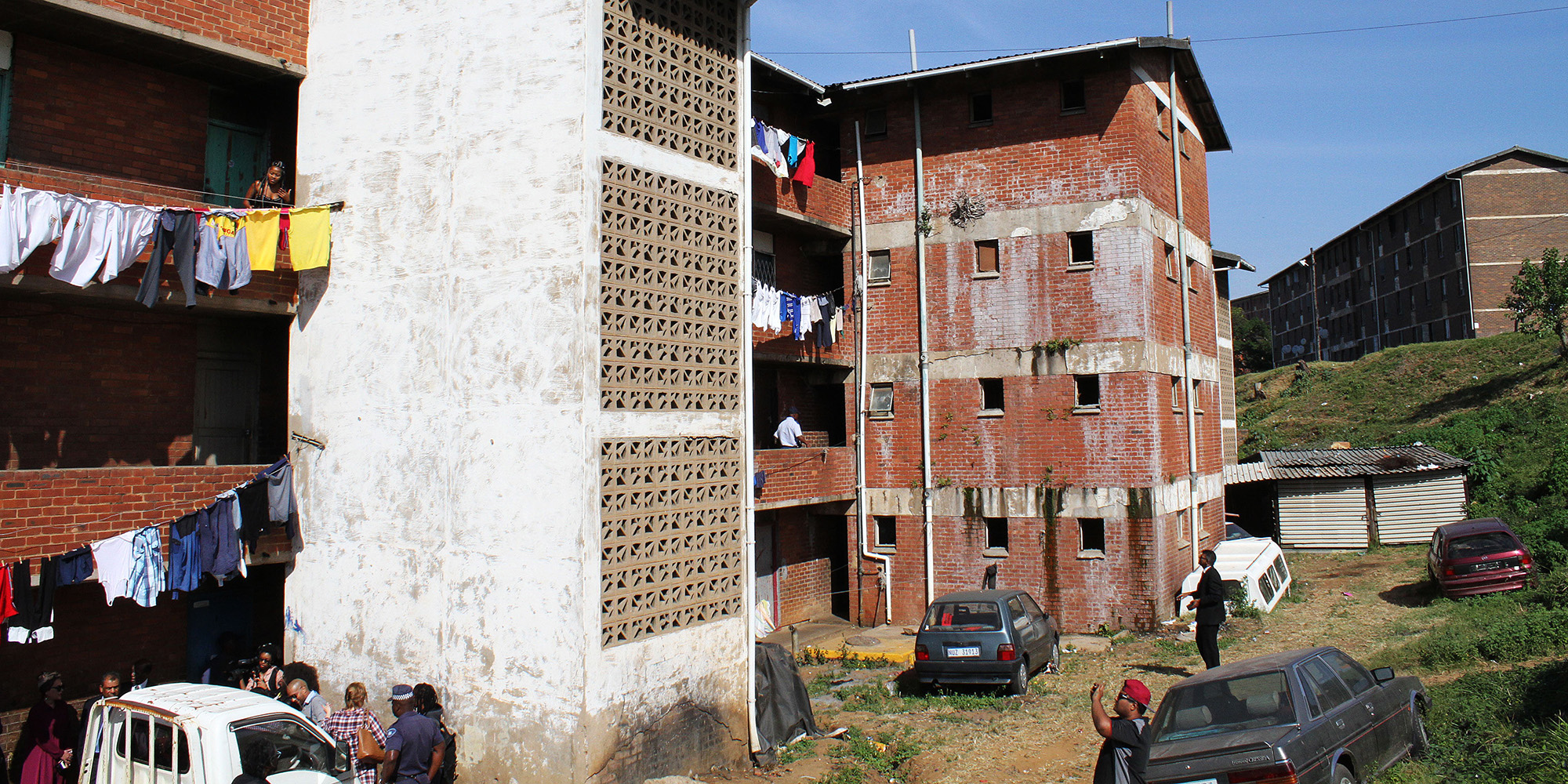
The Moerane Commission of Inquiry visits the Glebelands Hostel in Umlazi to assess and gather evidence on political killings around KwaZulu-Natal on July 21, 2017 in Durban, South Africa. Members of the commission visited the hostel after it was heard that more than 80 people were killed but no one has been arrested. The murders blamed on politics, power, financial enrichment, and criminality. (Photo: Gallo Images / City Press / Siyanda Mayeza)
According to Dube, the murder of at least nine ANC members in KZN — whether councillors or party officials — since September last year speaks to the intensity of conflict within the party. Murders, he said, are often directly related to the outcome of state tenders or internal ANC elections: “There is a lot of money flowing in [the] ANC and people entrusted with dispensing that are vulnerable, especially in a party that is indistinguishable from gangsters and taxi bosses who control contract killers.”
Both Dube and De Haas agreed that the intersection of politics and violence has wider implications for policing and the rule of law in KZN. De Haas argued that shambolic investigations and corruption have “a devastating impact on the morale of good cops. Even they are scared. You cannot have democracy while people live in terror.”
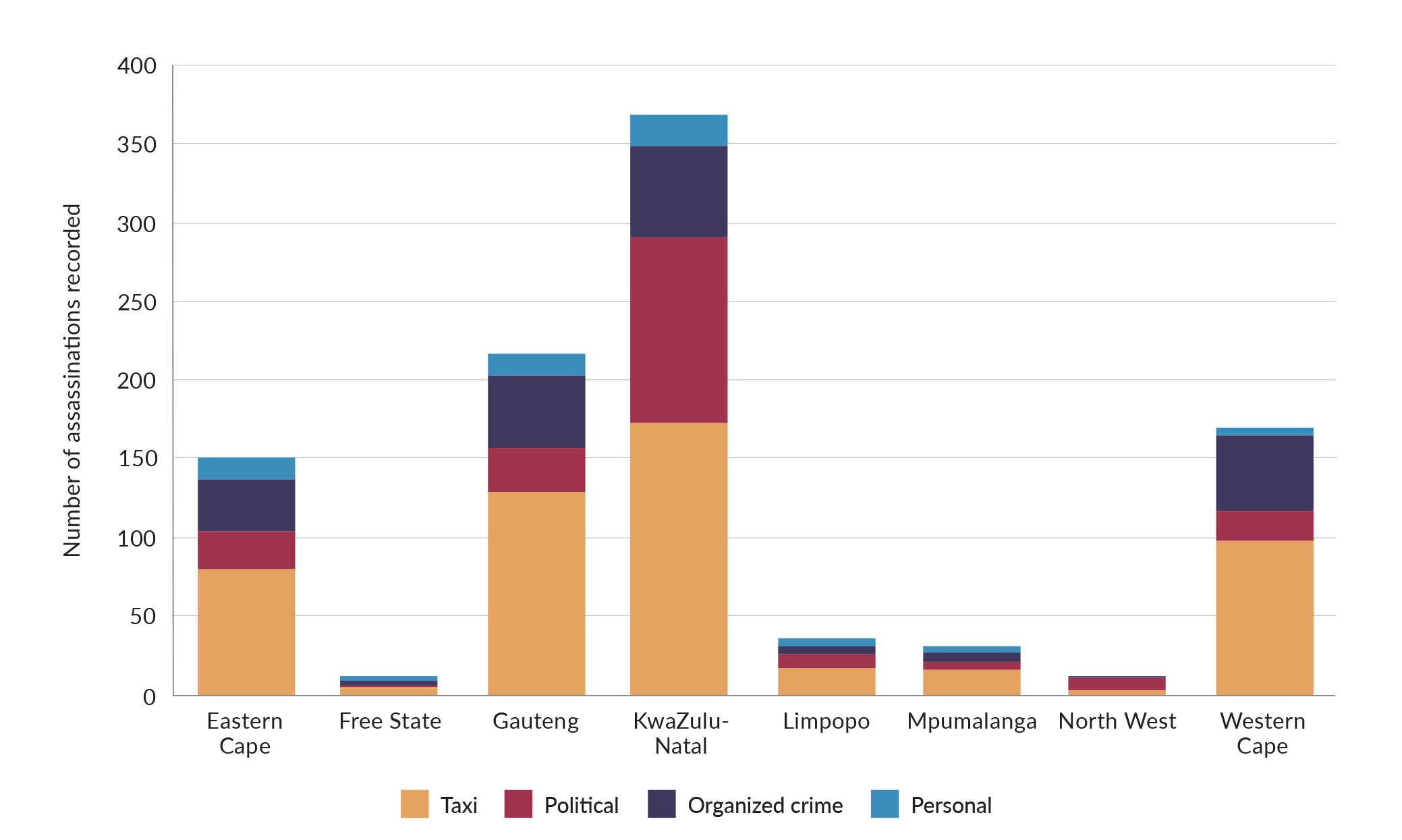
Assassinations-in-South-Africa-per-province-2015-2021
Dube also pointed to increased drug-related violence in the province as evidence that police cannot ensure the rule of law in the region. In January 2022, four people were killed in a shooting in KwaMakhutha, with a further eight people shot dead in Richmond and six in Inanda. Police suspect all three incidents were drug related.
Beyond assassinations: How patronage and intimidation shape KZN’s political landscape
For many observers, the politics of KZN have become characterised by intimidation and patronage. In April 2022, former eThekwini mayor Zandile Gumede was elected as the region’s ANC chairperson. Gumede is an ally of former president Jacob Zuma — whose supporters are rallying against a second term for current ANC and country president Cyril Ramaphosa — and is seen as a key figure in the RET faction.
Gumede faces a raft of corruption charges relating to an irregular municipal waste tender worth R320-million that was awarded in 2017. The charges include theft, money laundering, fraud, corruption, and racketeering. Gumede and her 21 co-accused will face a total of 2,793 charges, including contravention of the Prevention of Organised Crime Act (Poca).
At Gumede’s election, S’bu Zikode, president of the shack dwellers’ movement Abahlali baseMjondolo, summed up the view of many ANC critics of Gumede: “She puts the party before the country […]. What does this say about the people who voted her in, given the serious charges she faces? When she was mayor the city was characterised by high levels of gangsterism, violence and corruption, not to mention service delivery failures.”
Gumede’s reign as mayor earned her the moniker “Iron Lady of Inanda”, with the rise of mafia-like “business forums” under the banner of RET. Characterised by violence and armed intimidation, these groups invaded and disrupted construction sites and extorted money. In 2018, the then-Auditor General withdrew an audit team from the city after its members received death threats.
At the time of Gumede’s election, political commentator and University of KwaZulu-Natal research fellow Imraan Buccus referred to the mayoral appointment as indicative of a predatory elite showing disdain for constitutional democracy: “[Gumede’s] people have secured the patronage network. Now it is about how the spoils are dispensed. Local government has become the focus of looting even if it means killing other people. […] These people have flourished in an era of thuggery, violence, and villainy.”
Police response to KZN assassinations
While the SAPS has received considerable criticism for its failure to effectively respond to assassinations, Police Minister Bheki Cele told a press conference in February 2022 that a special state task team probing political murders since 2018 had investigated 258 dockets, resulting in 289 arrests. Cele said this meant that 32 more murder investigations had taken place since a previous media briefing on political killings eight months earlier.
According to Cele, the primary motive for killings was intra-political and taxi conflict. Cele claimed that political violence was on the decrease, saying at the time that only nine people had been murdered in the run-up to the local government elections of 2021, compared with 29 preceding the 2016 poll.
Yet observers such as De Haas have been scathing of Cele’s task team and its results. “[The task team] claims success, but we have yet to see a breakdown of how many political murder cases are even in court, let alone any convictions achieved,” said De Haas.
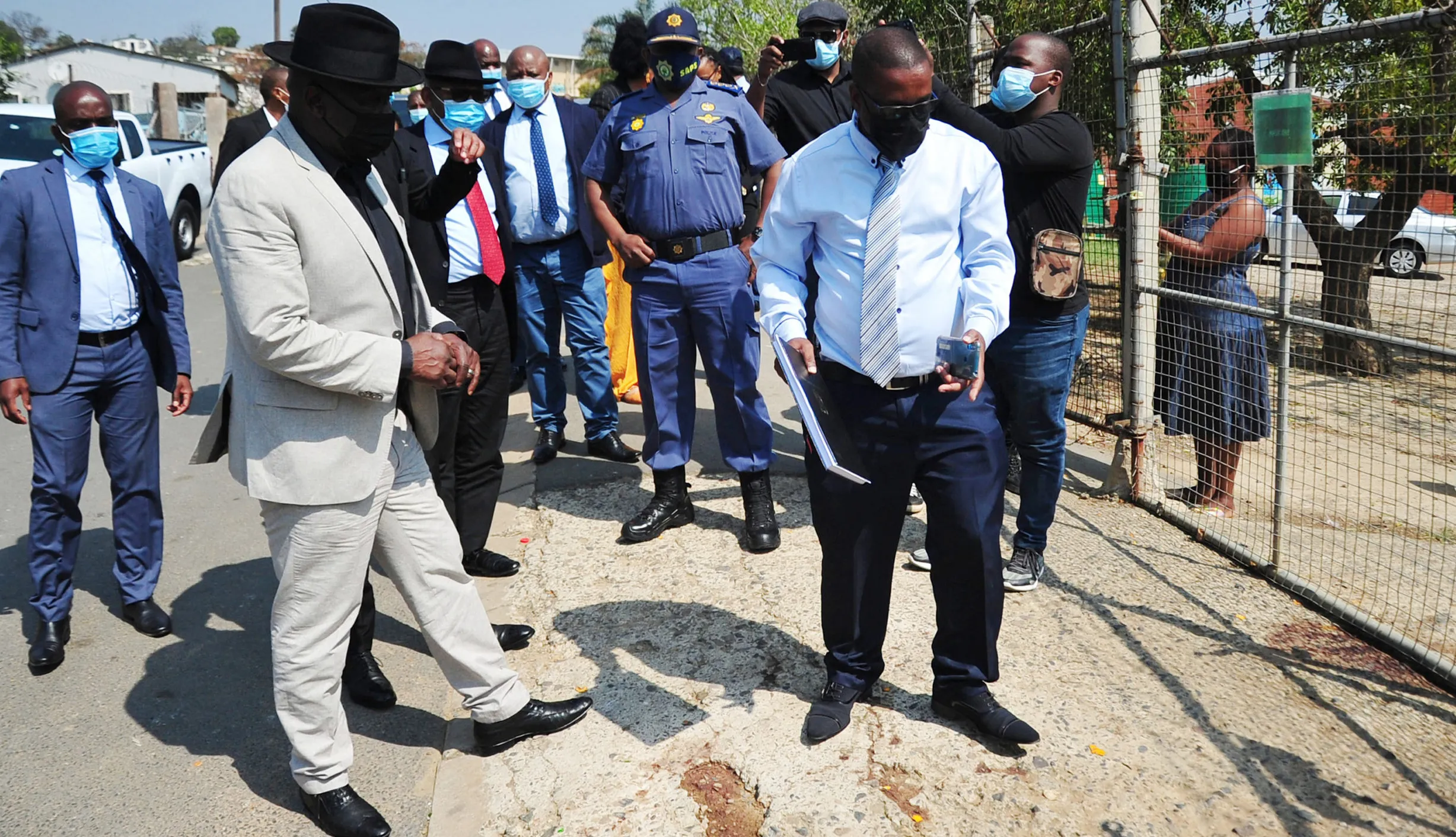
Minister of Police, General Bheki Cele (second-left) visits the family homes of the deceased and crimes scenes on September 14, 2021 in Inanda Township on September 14, 2021 in Durban, South Africa. The visit comes after a black Opel Corsa bakkie with five occupants, opened fire at a group of people waiting outside local primary school and killing Ncami Shange (34), Beatrice Nzama (60) and Philisiwe Jili (37). Five more people were injured and taken to hospital. (Photo: Gallo Images/Darren Stewart)
Not everyone shares this view, however. Among the cases Cele counted as a victory at his February 2022 press conference was that of hitman Fisokuhle Ntuli, now behind bars for six murders, including the 2016 killing of an ANC councillor. Ntuli is also regarded as a person of interest by police in 14 other cases, including the murder of national soccer star Senzo Meyiwa. The case of this seemingly prolific hitman demonstrates Dube’s argument that political and organised-crime hits are inextricably linked.
After Ntuli’s conviction for murdering ANC councillor Thami Nyembe, prosecutor Cyril Selepe said the work done by the task team had helped to “significantly reduce” political violence. “For us, it’s a huge milestone,” said Selepe. “It couldn’t have come at a better time, particularly in light of what is happening around the country with the so-called incidents of political killings, taxi violence and gang violence that is taking place. This conviction for us is going to send a very clear message to the potential anarchists that are lurking out there of the consequences of their actions.”
Systematisation of violence
According to Cheryl Potgieter, head of Gender, Justice, Health and Human Development at Durban University of Technology, political violence — a result of power, patronage, and systemic corruption — is “leading to a fractured state becoming a failed state”. Potgieter was one of three commissioners who were part of the state-appointed Moerane Commission, which probed political killings in KwaZulu-Natal in 2017. Upon the release of the commission’s report, Willies Mchunu, then-premier of KZN, said “the recruitment of criminal elements by politicians to achieve political ends, resulting in a complex matrix of criminal and political associations, inevitably contributes to political murders.”
Potgieter also argued that there are other ways of analysing and understanding political violence — for example, as a systemic, social phenomenon: “The role of patriarchy and violent masculinity has often been overlooked when analyses are done on what has been constructed or labelled as political killings,” she said.
Our data collection showing the frequency of assassinations in KZN and across South Africa reveals how targeted violence has increasingly become a systemic, embedded problem. Across the three different but clearly interlinked categories of violence — political, organised crime-related and taxi industry-related — the systemic issues identified by the Moerane Commission remain in place in KZN. DM
This article appears in the Global Initiative against Transnational Organized Crime’s monthly East and Southern Africa Risk Bulletin. The Global Initiative is a network of more than 500 experts on organised crime drawn from law enforcement, academia, conservation, technology, media, the private sector and development agencies. It publishes research and analysis on emerging criminal threats and works to develop innovative strategies to counter organised crime globally. To receive monthly Risk Bulletin updates, please sign up here.

















 Become an Insider
Become an Insider
Comments - Please login in order to comment.